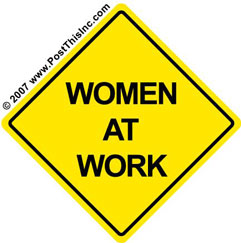December 9, 2008, - 4:13 pm
The New “Gender Gap”: You Know Who’s Really Hardest Hit . . .
By Debbie Schlussel
. . . by the tough economy? Men. 12,000 more women are working than were at this time, last year. Yet, 1,069,000 fewer men are working than a year ago.
And while this article doesn’t say so, I think one of the reasons is affirmative action. Companies can’t let minorities and women go, or they’ll suffer lawsuits, so they sacrifice the most expendable first, and that’s the White Male. Another problem is the loss of American manufacturing jobs, which were an excellent domain for blue collar males without a college degree.
The careers of Neal Boyle and Scott Hacker couldn’t be more different. Boyle, whose education ended with high school, worked 20 years crushing rocks at the US Gypsum plant in Charlestown. Hacker, who holds an MBA, changed firms several times as he moved up the management ranks in New England’s financial services industry.
But today they find themselves in the same place: laid off and looking for work. And together they represent the face of the current recession, one that is overwhelmingly male.


Men are losing jobs at far greater rates than women as the industries they dominate, such as manufacturing, construction, and investment services, are hardest hit by the downturn. Some 1.1 million fewer men are working in the United States than there were a year ago, according to the Labor Department. By contrast, 12,000 more women are working.
This gender gap is the product of both the nature of the current recession and the long-term shift in the US economy from making goods, traditionally the province of men, to providing services, in which women play much larger roles, economists said. For example, men account for 70 percent of workers in manufacturing, which shed more than 500,000 jobs over the past year. Healthcare, in which nearly 80 percent of the workers are women, added more than 400,000 jobs.
“As the recession broadens, the gap between men and women is going to close somewhat,” said Andrew Sum, director of the Center for Labor Market Studies at Northeastern University. “But right now, the sectors that are really getting pounded are intensely male.”
The divide is far starker than it was in last recession, when the technology crash battered professional and technical sectors in which women now hold more than 40 percent of jobs. From the beginning of 2001 to the beginning of 2002, the number of employed men declined by about 900,000, while the population of women with jobs fell by about 700,000. The male-dominated construction industry held up much better then, too, as falling interest rates began to fuel the housing boom. . . .
Construction firms, in which 90 percent of workers are men, have cut more than 500,000 jobs, or nearly 7 percent of employment, over the past year. Men account for more than 60 percent of employment in investment firms, which through October had cut 1 percent, or 9,000 jobs. . . .
Finding jobs to replace the high-paying, blue-collar work that traditionally sustained men like Boyle and their families is among the greatest challenges facing the US economy, said the Center for Labor Market Studies’ Sum. The erosion of these jobs has undermined both family income and family structure, he said. . . .
“We lost a lot of jobs that used to be an opportunity for these young guys,” Sum said. “But we haven’t figured out how to create good-paying, blue-collar jobs for men who don’t have a college degree.”
So, when are White males gonna get their affirmative action, since they’re clearly now the disadvantaged group in America? Don’t hold your breath.
Despite this single story in the Boston Globe, the rest of the liberal mainstream media is still singing the same old tune about how women and minorities are hardest hit in these economically depressed (or is that “recessed”?) times. Today’s Wall Street Journal has stories about how more women are selling their eggs for money in these tough times, and about how the Small Business Administration loan caps allegedly hurt women and minorities.
Get out the (pink) violin.
Maybe we should call ours the “Title IX” economy, because, after all, “equality” here means dumping on the men.


Classic joke, Deb:
Q: What’s the difference between recession and depression?
A: A recession is when your neighbor loses his job. A depression is when *you* lose your job.
ObamaSlammaJamma on December 9, 2008 at 5:14 pm